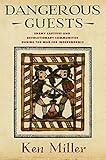Dangerous Guests : Enemy Captives and Revolutionary Communities during the War for Independence / Ken Miller.
Material type: TextPublisher: Ithaca, NY : Cornell University Press, [2014]Copyright date: ©2014Description: 1 online resource (264 p.) : 4 b&w halftones, 2 mapsContent type:
TextPublisher: Ithaca, NY : Cornell University Press, [2014]Copyright date: ©2014Description: 1 online resource (264 p.) : 4 b&w halftones, 2 mapsContent type: - 9780801454943
- 973.3 23/eng/20230216
- online - DeGruyter
| Item type | Current library | Call number | URL | Status | Notes | Barcode | |
|---|---|---|---|---|---|---|---|
 eBook
eBook
|
Biblioteca "Angelicum" Pont. Univ. S.Tommaso d'Aquino Nuvola online | online - DeGruyter (Browse shelf(Opens below)) | Online access | Not for loan (Accesso limitato) | Accesso per gli utenti autorizzati / Access for authorized users | (dgr)9780801454943 |
Browsing Biblioteca "Angelicum" Pont. Univ. S.Tommaso d'Aquino shelves, Shelving location: Nuvola online Close shelf browser (Hides shelf browser)

|

|

|

|

|

|

|
||
| online - DeGruyter What Galileo Saw : Imagining the Scientific Revolution / | online - DeGruyter Brotherly Love : Freemasonry and Male Friendship in Enlightenment France / | online - DeGruyter Orchids of Tropical America : An Introduction and Guide / | online - DeGruyter Dangerous Guests : Enemy Captives and Revolutionary Communities during the War for Independence / | online - DeGruyter "Who, What Am I?" : Tolstoy Struggles to Narrate the Self / | online - DeGruyter Making Money in Sixteenth-Century France : Currency, Culture, and the State / | online - DeGruyter The Space That Remains : Reading Latin Poetry in Late Antiquity / |
Frontmatter -- Contents -- Acknowledgments -- Prologue: A Community at War -- 1. “A Colony of Aliens” -- 2. “Divided We Must Inevitably Fall” -- 3. “A Dangerous Set of People” -- 4. “’Tis Britain Alone That Is Our Enemy” -- 5. “Enemies of Our Peace” -- 6. “The Country Is Full of Prisoners of War” -- Epilogue -- Notes -- Index
restricted access online access with authorization star
http://purl.org/coar/access_right/c_16ec
In Dangerous Guests, Ken Miller reveals how wartime pressures nurtured a budding patriotism in the ethnically diverse revolutionary community of Lancaster, Pennsylvania. During the War for Independence, American revolutionaries held more than thirteen thousand prisoners—both British regulars and their so-called Hessian auxiliaries—in makeshift detention camps far from the fighting. As the Americans’ principal site for incarcerating enemy prisoners of war, Lancaster stood at the nexus of two vastly different revolutionary worlds: one national, the other intensely local. Captives came under the control of local officials loosely supervised by state and national authorities. Concentrating the prisoners in the heart of their communities brought the revolutionaries’ enemies to their doorstep, with residents now facing a daily war at home. Many prisoners openly defied their hosts, fleeing, plotting, and rebelling, often with the clandestine support of local loyalists. By early 1779, General George Washington, furious over the captives’ ongoing attempts to subvert the American war effort, branded them "dangerous guests in the bowels of our Country." The challenge of creating an autonomous national identity in the newly emerging United States was nowhere more evident than in Lancaster, where the establishment of a detention camp served as a flashpoint for new conflict in a community already unsettled by stark ethnic, linguistic, and religious differences. Many Lancaster residents soon sympathized with the Hessians detained in their town while the loyalist population considered the British detainees to be the true patriots of the war. Miller demonstrates that in Lancaster, the notably local character of the war reinforced not only preoccupations with internal security but also novel commitments to cause and country.
Mode of access: Internet via World Wide Web.
In English.
Description based on online resource; title from PDF title page (publisher's Web site, viewed 26. Apr 2024)


